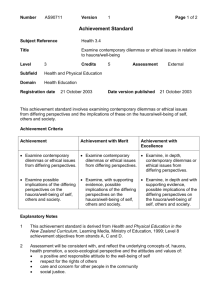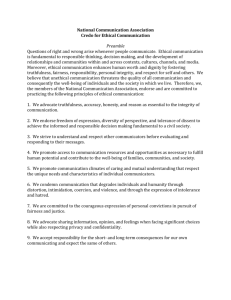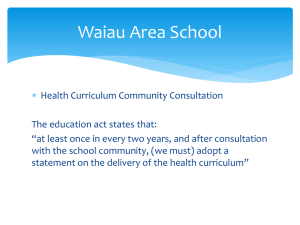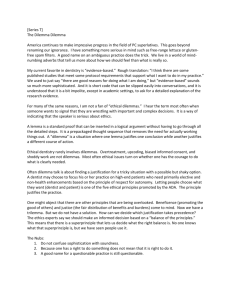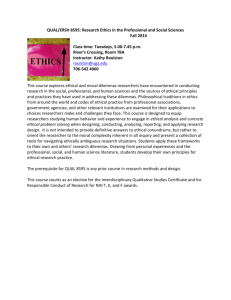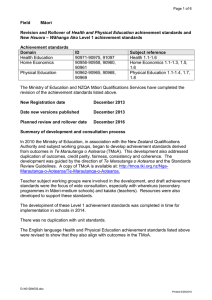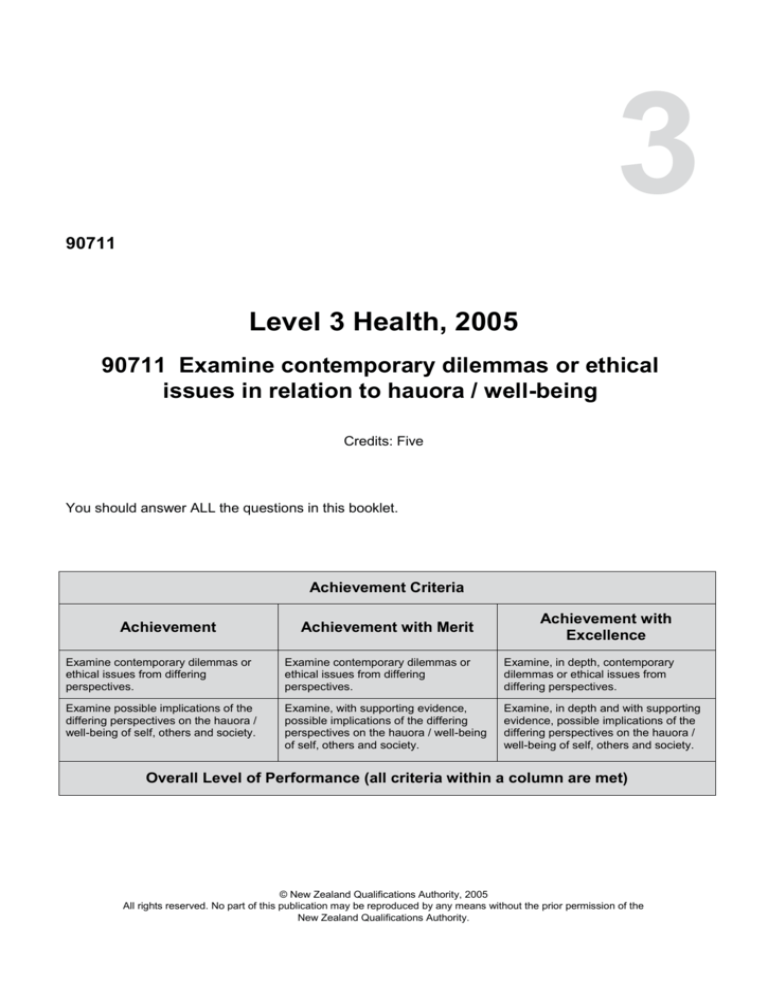
3
90711
Level 3 Health, 2005
90711 Examine contemporary dilemmas or ethical
issues in relation to hauora / well-being
Credits: Five
You should answer ALL the questions in this booklet.
Achievement Criteria
Achievement with Merit
Achievement with
Excellence
Examine contemporary dilemmas or
ethical issues from differing
perspectives.
Examine contemporary dilemmas or
ethical issues from differing
perspectives.
Examine, in depth, contemporary
dilemmas or ethical issues from
differing perspectives.
Examine possible implications of the
differing perspectives on the hauora /
well-being of self, others and society.
Examine, with supporting evidence,
possible implications of the differing
perspectives on the hauora / well-being
of self, others and society.
Examine, in depth and with supporting
evidence, possible implications of the
differing perspectives on the hauora /
well-being of self, others and society.
Achievement
Overall Level of Performance (all criteria within a column are met)
© New Zealand Qualifications Authority, 2005
All rights reserved. No part of this publication may be reproduced by any means without the prior permission of the
New Zealand Qualifications Authority.
You are advised to spend 60 minutes answering the questions in this booklet.
Ethical Issues and Dilemmas in Health Education
There are currently many health issues in New Zealand that divide people, depending on what they
believe is right or wrong, or what they agree with or do not agree with. These health issues, by their
very nature, create ethical dilemmas.
QUESTION ONE: Different Perspectives on Ethical Issues and Dilemmas
Select TWO of the ethical issues from the list below on which to answer the questions that follow.
Ethical Issues
Tick TWO only
ISSUE A:
The decriminalisation (or legalisation) of cannabis
ISSUE B:
The legalisation of euthanasia
ISSUE C:
Equal legal rights for same-sex partners
ISSUE D:
Different levels of government taxation on ‘healthy’ and ‘unhealthy’ foods
ISSUE E:
Unlimited access to sexually explicit materials
ISSUE F:
Unlimited access to assisted reproductive technology (ART)
ISSUE G:
Public health immunisation programmes targeting high-risk populations
Set out your answers under the issue headings provided, using the first issue to answer Question
One (a) on page 3 and the second issue to answer Question One (b) on page 5.
You will also require ONE of these issues to answer Question Two on pages 7–9.
L3 Health 2005, 90711 – page 2 of 6
(a)
SELECTED ISSUE (1):
(i)
Identify TWO different and significant perspectives of the issue.
These perspectives need to clearly show the nature of the ethical dilemma.
The perspectives need to be those that feature most commonly in current (or
recent) public debate about the issue.
Perspective (1):
Perspective (2) (a different perspective):
(ii)
Examine in depth these two different perspectives of the issue that make it an ethical
dilemma.
An in-depth examination needs to include:
a clear explanation of the understanding, values and beliefs that people have about
the health issue (what is the position of the people who support this perspective of
the issue?)
a reasoned argument to support their position (why is this the position of the people
who support this perspective of the issue?)
a balance of both views (you are not required to give your own opinion)
a focus on only the health-related aspects of the issue.
L3 Health 2005, 90711 – page 3 of 6
(b)
SELECTED ISSUE (2):
(i)
Identify TWO different and significant perspectives of the issue.
These perspectives need to clearly show the nature of the ethical dilemma.
The perspectives need to be those that feature most commonly in current (or
recent) public debate about the issue.
Perspective (1):
Perspective (2) (a different perspective):
(ii)
Examine, in depth, these two different perspectives of the issue that make it an ethical
dilemma.
An in-depth examination needs to include:
a clear explanation of the understanding, values and beliefs that people have about
the health issue (what is the position of the people who support this perspective of
the issue?)
a reasoned argument to support their position (why is this the position of the people
who support this perspective of the issue?)
a balance of both views (you are not required to give your own opinion)
a focus on only the health-related aspects of the issue.
L3 Health 2005, 90711 – page 4 of 6
QUESTION TWO: Implications of Ethical Dilemmas for Self, Others and Society
Select ONE of the issues discussed in Question One and use this issue only, to answer the following
question.
The issue selected from Question One:
Examine, in depth, the implications of BOTH of the perspectives discussed in Question One, for
the hauora / well-being of:
(i)
those people directly affected by the issue
(ii) other people or groups who are closely connected to those people directly affected by the
issue
(iii) the whole community or all of society.
An in-depth examination must be supported by relevant evidence:
Relevant evidence comes from actual current (or recent) public debate on the issue.
The implications for hauora / well-being should focus, where relevant, on people’s human
rights, people’s safety, the effects on people’s social structures, the implications for healthpromotion opportunities related to the issue, the implications for the culture of the society.
Across all answers there should be consideration of some short-term and some long-term
implications.
(a)
Perspective (1)
(i)
Implications of this perspective for the hauora / well-being of those people directly affected
by the issue:
(ii)
Implications of this perspective for the hauora / well-being of other people or groups who
are closely connected to those people directly affected by the issue:
L3 Health 2005, 90711 – page 5 of 6
(iii)
(b)
Implications of this perspective for the hauora / well-being of the whole community or all
of society:
Perspective (2)
(i)
Implications of this perspective for the hauora / well-being of those people directly
affected by the issue:
(ii)
Implications of this perspective for the hauora / well-being of other people or groups who
are closely connected to those people directly affected by the issue:
(iii)
Implications of this perspective for the hauora / well-being of the whole community or all of
society:
L3 Health 2005, 90711 – page 6 of 6

